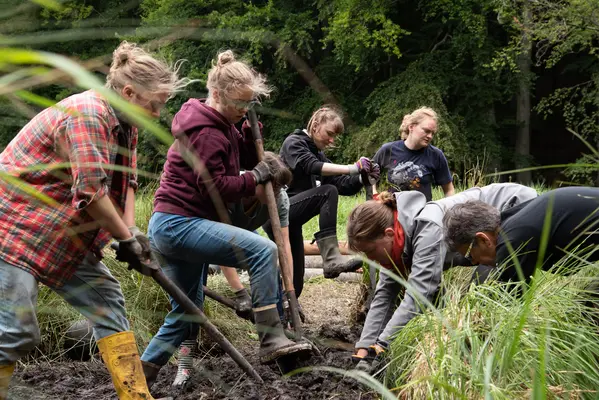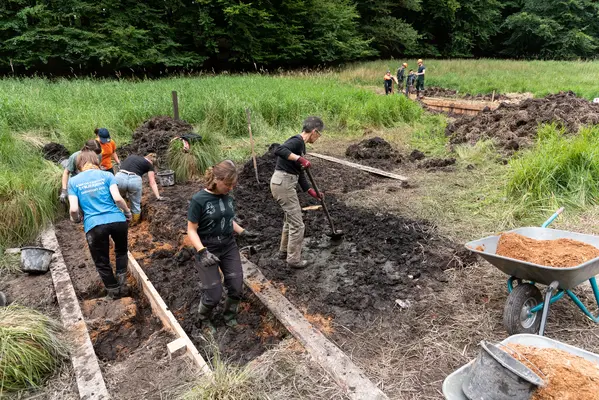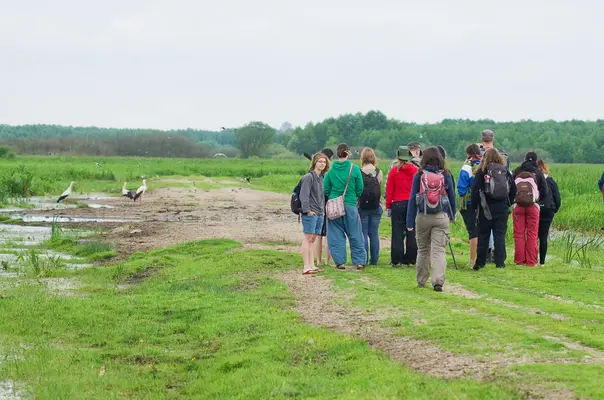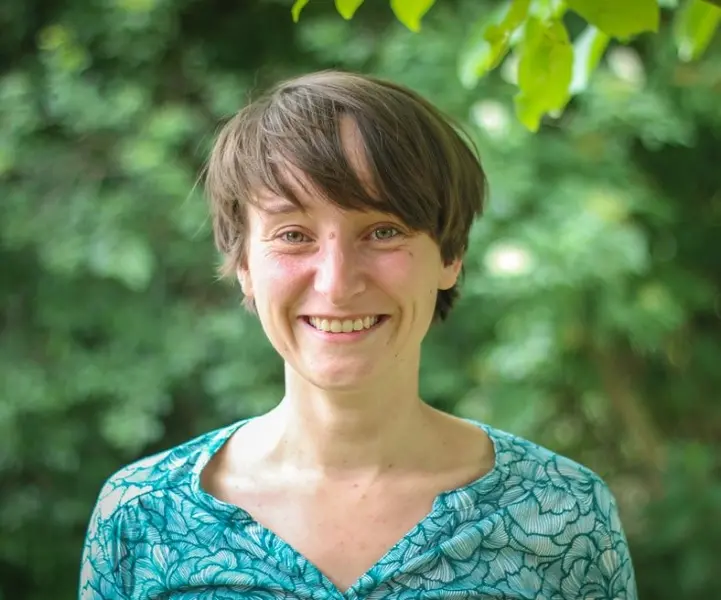Individual study contents
You complete the Landscape Use and Nature Conservation degree programme after six semesters. Afterwards, you can enter professional life directly or continue your qualification with a Master's degree. In the first third of the study programme, only the basics are taught. Then, as a student in the 3rd semester, you begin your practical study semester (practical phase). The 4th, 5th and 6th semesters form the specialised studies, in which you specialise in compulsory elective modules and with a thematic final thesis in the 6th semester.
Modules per semester
In the basic studies (first and second semesters), the focus is on teaching the fundamentals of natural sciences.
You will learn the basics of the abiotic landscape components soil, hydrology, geology, geomorphology and climate as well as their interaction. Questions related to the landscape are applied and you acquire methodological skills in the respective disciplines.
In this module you will learn essential characteristics of systematic groups of organisms in the animal and plant kingdoms. Relationships between morphology, way of life and ecology of organisms as well as terms, goals, guiding principles, legal framework and administration of nature conservation are contents of the module.
After completing the compulsory module, you will be able to name and recognise ecosystem compartments and eco-system interactions and establish detailed, interdisciplinary references to sustainable development. You will be familiar with the discourses relevant to sustainability after attending the module.
Here you will deal with the legal foundations of nature conservation and environmental protection as well as administrative action. You will learn about the system of spatial planning in Germany and the environmental assessment procedures for spatially relevant projects.
Learn central techniques of scientific work, their interdisciplinary application as well as work processes for the joint creation of scientific achievements.
In the basic studies (first and second semesters), the focus is on teaching the fundamentals of natural sciences.
In this module you will develop an understanding of the effects in the ecosystem and the inclusion of social demands on the landscape. You will also learn to think in landscape contexts and become familiar with methods for recording and evaluating landscape subspaces.
Now you will learn everything about the basics of soil functions, soil types and soil processes as well as the ecological functions and quality of water bodies. You will know classifications and laws of flora and their indications for nature conservation assessment. You will be able to relate the vegetation features of a landscape to abiotic site characteristics.
Learn about interactions between animals in their diversity and their environments. Attend scientific seminars on selected animal species relevant to land use or nature conservation. Complete practical courses on various animal indicator groups and their recording.
You will be able to map soils, know the connection with site conditions (e.g. landscape water, relief) and use. You will become familiar with evaluation parameters and methods in the field and laboratory. You will assess results according to agricultural and nature conservation criteria. You will also learn to derive development and management goals from them.
Here you will learn about the development history and characteristics of landscapes shaped by humans, analyse landscapes including rural settlements on the basis of maps, geodata and on-site inspections. From this you will derive maintenance and development concepts.
In the third semester, there is a work-related internship with a focus on biotope mapping, landscape analysis and practical landscape management.
You will learn the basics of communication and public relations. We provide you with an understanding of public relations as a management task and the systematic planning of PR actions. Psychological basics of human behaviour in the human-nature relationship, the importance of interdisciplinary views of people and the world as well as values and ethics are also part of the module.
You will apply, reflect on and deepen the factual and methodological knowledge acquired in the first year of study in a subject- and practice-specific context. You practise communicating and arguing in a professional environment and team. The planning of the implementation of assigned tasks takes place in coordination with the supervisors.
From the fourth semester onwards, you begin your specialised studies, in which you determine a selection of in-depth compulsory elective modules for your specialisation in the degree programme.
We show you the field of tension between landscape as an ecosystem and the use of natural resources by human society. Current challenges (including climate change, loss of biodiversity, soil degradation), landscape and land use change and strategies of sustainable management are the topics of this module.
Learn central techniques of working with data and their interdisciplinary application. At the end of the module you will be able to collect, analyse and visualise data scientifically.
Gain basic knowledge about forms of sustainable agriculture, forestry and tourism land use in the context of current challenges such as climate change and biodiversity loss. Learn about the constraints under which land users operate. Analyse conflicts and synergies arising from the protection and sustainable use of ecosystems.
This module is designed as a self-organised and autonomous work process. The expert processing of a landscape section in the vicinity of the study location is part of this. Record the natural environment and area features, carry out a nature conservation assessment and record use and management requirements. You will practise the use of methodological instruments and scientific practice.
You will expand your basic knowledge from "GIS basics". Design and implement independent project work with spatial research questions or planning with GIS. Get to know basic requirements and possibilities of CAD-supported open space planning and implement contents/functions. You will receive basic knowledge as a basis for independent further training.
This module is about identifying clear insights into the views and attitudes of the population. "Ecological action" does not start from the physical components of ecosystems, but begins with people and groups. Using the example of changing landscape spaces (e.g. Lüneburg Heath), you will supplement object-related approaches to landscape with the subject-related level.
Like the fourth semester, the fifth semester also serves to specialise in the degree programme through the selection of in-depth compulsory elective modules.
Now you will get to know analysis and assessment methods of landscape planning and environmental impact assessment of projects, assess relevant assessment methods with regard to their relevance and validity and apply them yourself in a basic way.
They get to know procedures of species and biotope protection, use and development under integration of nature conservation requirements, nature conservation restrictions of land use as well as legal framework conditions and measures to achieve nature conservation goals such as the EU Habitats Directive and WFD.
In economics, you will understand decision-making behaviour and the interaction of people, reflect on economic and socio-political mechanisms for the efficient distribution of scarce social and natural resources. You will be able to name and classify the basics and goals of entrepreneurial decision-making and confidently apply central business management terms.
In the project work, you solve a task from the practice of nature conservation or sustainable landscape use in a goal-oriented manner with the participation of cooperation partners within a specified time frame.
You take part in the simulation of a Conference of the Parties (COP) to an international environmental agreement (UNCCD). You take on the role of a country representative and represent the interests of a country. Find a balance between your own interests and the interests of the international community. Learn to find compromises.
Landscape is shared space - this results in many communication challenges. Where interests and demands meet, those involved must develop common ideas on how landscape can be shaped. Communication strategies are needed to avoid getting lost in individual perspectives. This is what you will learn in this module.
This module teaches types and ecological characteristics of peatlands, water bodies and floodplains as well as important methods for their status analysis. You will get an overview of common and alternative management measures.
There are the sub-modules Database Management, Empirical Social Research and Statistical Methods for Collecting and Processing Spatial Data. You choose a sub-module and acquire suitable methodological competences to work on your BSc thesis. Plan and carry out the collection and analysis of primary and secondary data.
Develop educational offers such as guided tours for different target groups in nature and landscape.
In cooperation with the Bergwaldprojekt e.V., you will learn about practical nature conservation and landscape management measures - with a focus on peatland rewetting. In addition, there is specific theoretical methodological work that complements the professional competences of the Bergwaldprojekt e.V..
For a defined spatial unit (catchment area, field, forest or similar), the components of the landscape water balance are recorded, own surveys are carried out and a water balance is drawn up from this. They assess groundwater and soil water availability and develop measures to stabilise and/or improve the water balance.
They learn to record grassland stands, assess them according to agricultural and nature conservation criteria, discuss development goals for the stands and derive appropriate management recommendations.
Possibilities for the conversion and use of regenerative forms of energy are shown with reference to agricultural enterprises. This includes the communication of current renewable energy sources with their conversion paths for energetic and material use as well as possibilities for the material and energetic use of renewable raw materials.
Learn technical English conducted at level B2 of the Common European Framework of Reference (CEFR).




